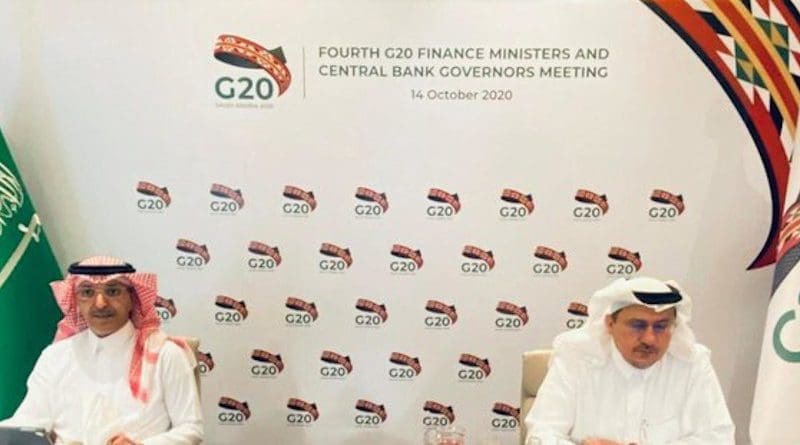G20 Suspends Poorer Nations’ Debt Payments For 6 More Months
By Arab News
By Frank Kane
Financial leaders of the world’s biggest economies claimed a “historic achievement” in reaching a framework to deal with heavily indebted poorer countries, which have been severely impacted by the coronavirus pandemic.
The finance ministers and central bank governors of the G20 nations agreed at a virtual meeting organized by the Saudi presidency in Riyadh to extend debt suspension for these countries by a further six months until June 2021.
Saudi Finance Minister Mohammed Al-Jadaan said the extension, as well as agreement on a “common framework” for handling insolvency issues for poorer countries, was a “major breakthrough in the global debt agenda.”
He added that some 73 poorer countries were eligible for debt suspension under the G20 scheme, and that 46 had already benefitted from the provisions.
Debt suspension could be extended even further, until the end of next year, and will be discussed again at a special meeting of G20 finance leaders next month at the time of the main summit.
But the Saudi finance minister was critical of some of the private investors holding poorer-country debt who have so far not gone along with the G20 governments’ plans.
“It is about time private investors also participated in the debt suspension. I encourage them to do so,” Al-Jadaan urged.
The official communique of the ministers and governors said they were “disappointed” with the response from the private sector on debt relief.
Al-Jadaan said the finance leaders had considered “all policy options” in their efforts to counter the economic effects of the pandemic — which has sent the global economy into a nosedive — but still needed to do more, especially with regard to emerging countries.
The communique noted that progress toward a “globally fair, sustainable, and modern international tax system” — especially relating to the digital economy — had been impacted by the G20’s focus on pandemic relief.
Member countries have pledged $11 trillion in fiscal and monetary stimulus to counter the pandemic.
Ahmed Al-Kholifey, governor of the Saudi Arabian Monetary Authority (SAMA), told journalists that the Kingdom’s economy had been contracting “like any other” in the first half of the year, but he hoped that the second half would be “less severe.”
He added: “SAMA has used monetary and fiscal tools, and we are seeing some positive numbers now.”
One worry, he admitted, was about the quality of assets within the economy. “We are watching that,” he said.

